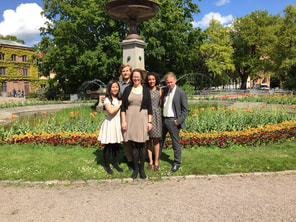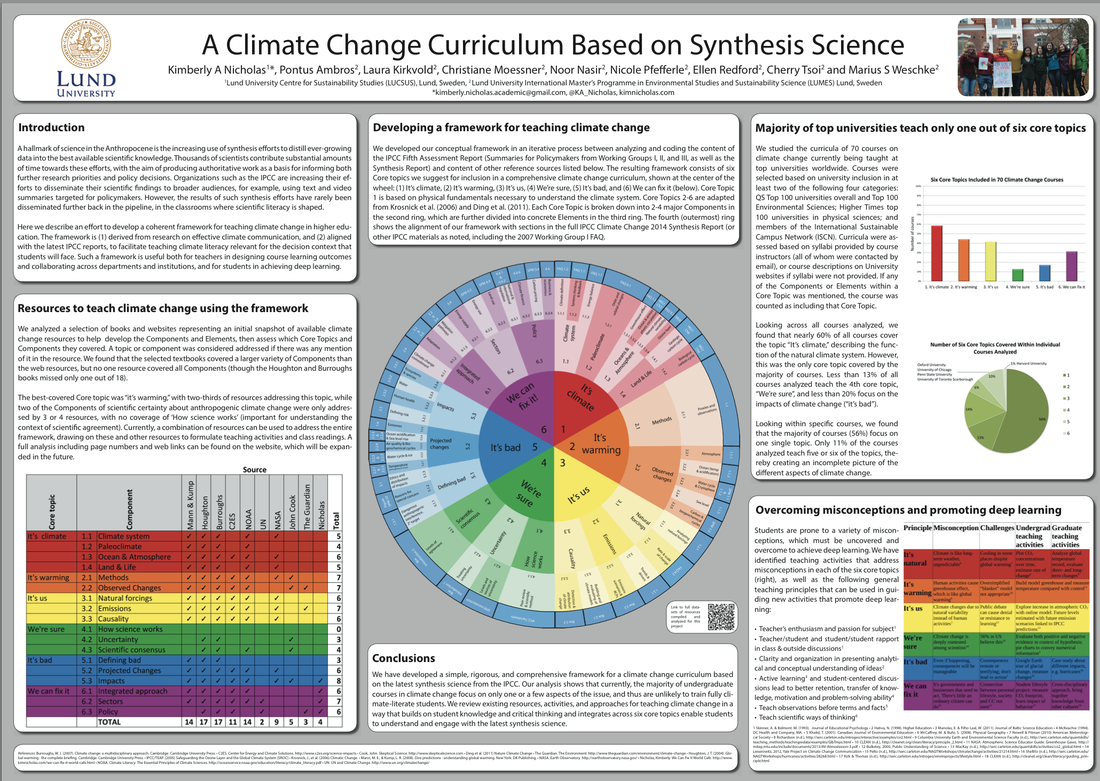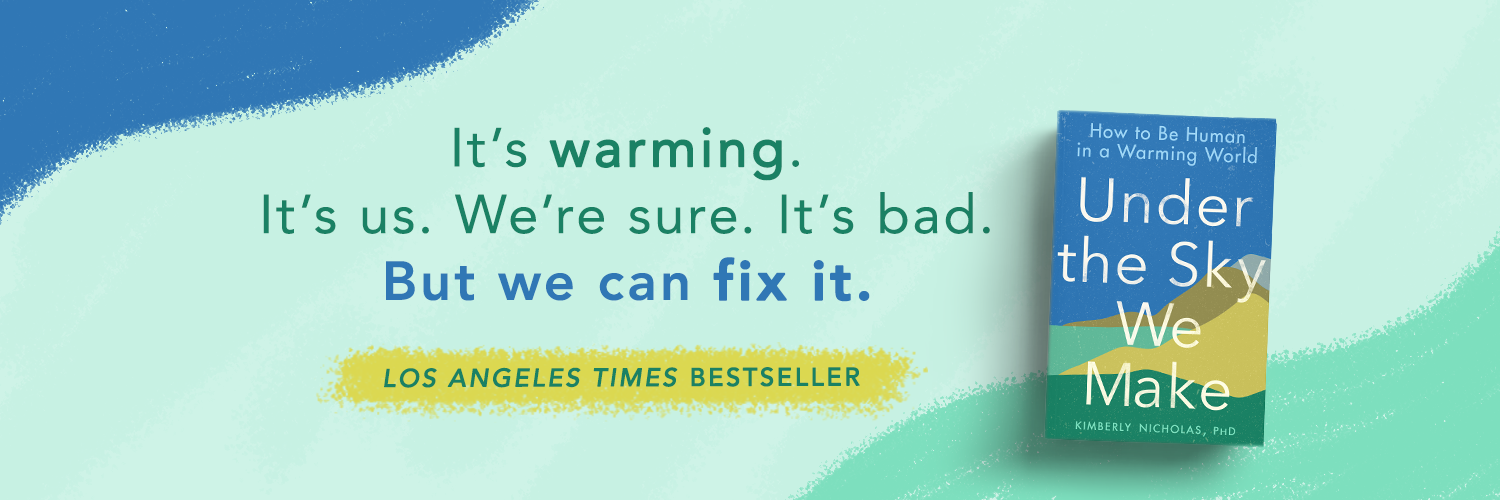A climate change curriculum based on synthesis science
|
I've structured my teaching on climate change based on the five points I first heard articulated by Jon Krosnick at in a lecture at Stanford:
1. It's warming 2. It's us 3. We're sure 4. It's bad 5. We can fix it (see the World Cafe teaching activity I started fall 2014). (These points are elaborated in a journal article (Krosnick et al., 2006, Climatic Change), and have subsequently been used in further research, e.g., this article by Ding et al. (2011) in Nature Climate Change on scientific certainty and support for climate policy.) (See here for the story of how these points made their way onto signs for the People's Climate March and March for Science.) Curriculum at a glance:I worked with a team of LUMES students to develop these core topics into a comprehensive climate change curriculum for college students, aligned with the latest synthesis science from the IPCC.
|
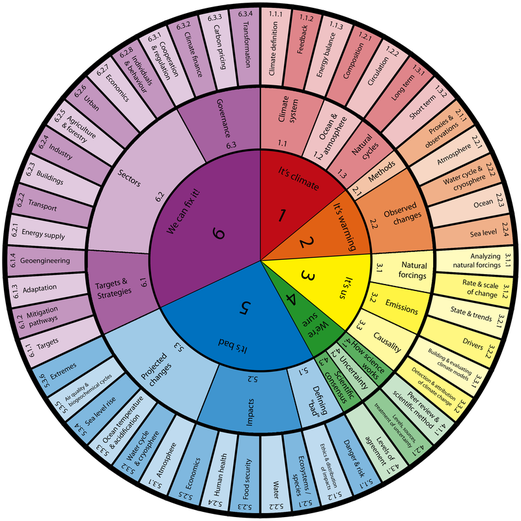

An Open-Source Climate Change Curriculum for University Education Based on IPCC Synthesis Science by Kimberly A Nicholas, Pontus Ambros, Laura Kirkvold, Christiane Moessner, Noor Nasir, Nicole Pfefferle, Ellen Redford, Cherry Tsoi, and Marius S Weshke is licensed under a Creative Commons Attribution-ShareAlike 4.0 International License.
Permissions beyond the scope of this license may be available at http://www.kimnicholas.com/.
Climate Literacy presentation at Lund University Teaching & Learning Conference
I presented this curriculum at the November 2019 Lund University Teaching and Learning Conference. Several colleagues expressed interest in using/adapting the curriculum in their teaching. All are welcome to do so, feel free to get in touch! In the talk, I summarized our recent research on climate education to answer four research questions:
The TL DN answer is in () below, see slides for more details:
1. What does one need to know to be climate literate? (Understand the IPCC Summary for Policymakers, which we made into a teaching framework, please use it!)
2. How well do universities teach climate literacy? (poorly)
3. How well do high schools teach climate literacy? (poorly)
4. How much do high schools focus on high-impact climate actions? (very little)
The TL DN answer is in () below, see slides for more details:
1. What does one need to know to be climate literate? (Understand the IPCC Summary for Policymakers, which we made into a teaching framework, please use it!)
2. How well do universities teach climate literacy? (poorly)
3. How well do high schools teach climate literacy? (poorly)
4. How much do high schools focus on high-impact climate actions? (very little)
Media, IPCC, & course analysis using the curriculum framework
|
We presented our results at the Our Common Future Under Climate Change meeting in Paris in July 2015, including an analysis of the alignment of the IPCC Synthesis Report with this framework, how the focus of the IPCC has evolved over time, how existing international courses reflect the focus of the IPCC.
You can see our submitted conference abstract here, or click to the right for a full resolution version of the poster. |
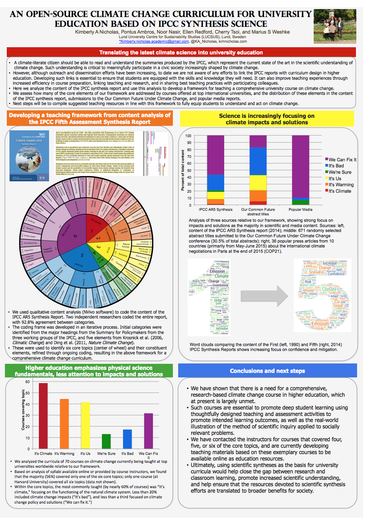
|
Building the curriculum
|
I worked with a larger team to prepare our initial findings, which I presented at the American Geophysical Union Fall Meeting on 15 December 2014. You can click here for a full-resolution copy of our poster. You are welcome to use this for teaching or other non-commercial use with attribution (please cite Nicholas et al., 2014, and link to this web page). Feedback welcome!
|
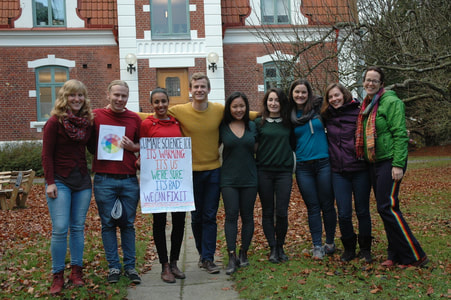 The Climate Change Curriculum team: (L-R) LUMES students Nicole Pfefferle, Pontus Ambros, Noor Nasir, Marius Weschke, Cherry Tsoi, Ellen Redford, Laura Kirkvold, Christiane Moessner, and Prof. Kim Nicholas. The Climate Change Curriculum team: (L-R) LUMES students Nicole Pfefferle, Pontus Ambros, Noor Nasir, Marius Weschke, Cherry Tsoi, Ellen Redford, Laura Kirkvold, Christiane Moessner, and Prof. Kim Nicholas.
|
Curriculum Resources
Here you'll find links to the underlying data used to create our AGU poster. These are a work in progress; please get in touch with questions or corrections! We would especially like to hear from professors who have used or modified this curriculum in teaching, or students who have been taught from this curriculum, but all comments are welcome.
Book and web resources data
Full list of climate change misconceptions and references
Universities and courses analyzed
Book and web resources data
Full list of climate change misconceptions and references
Universities and courses analyzed
